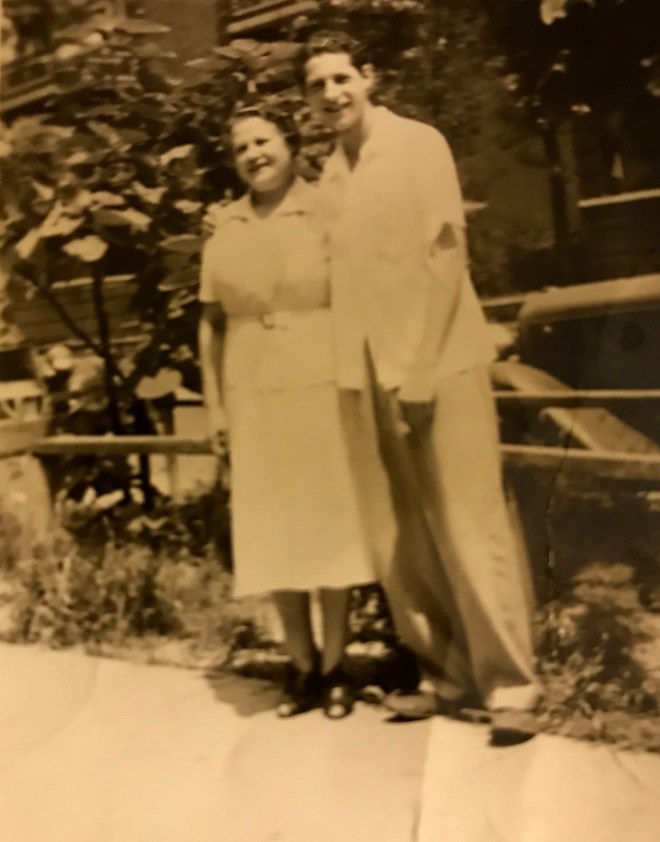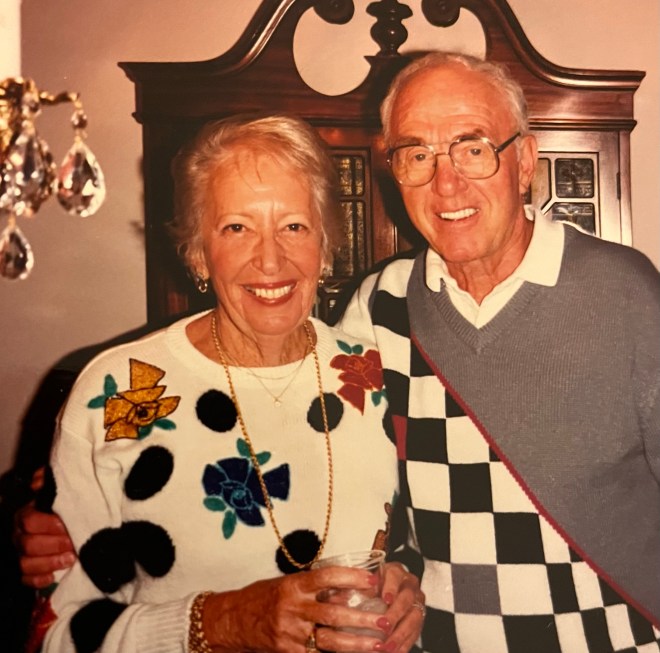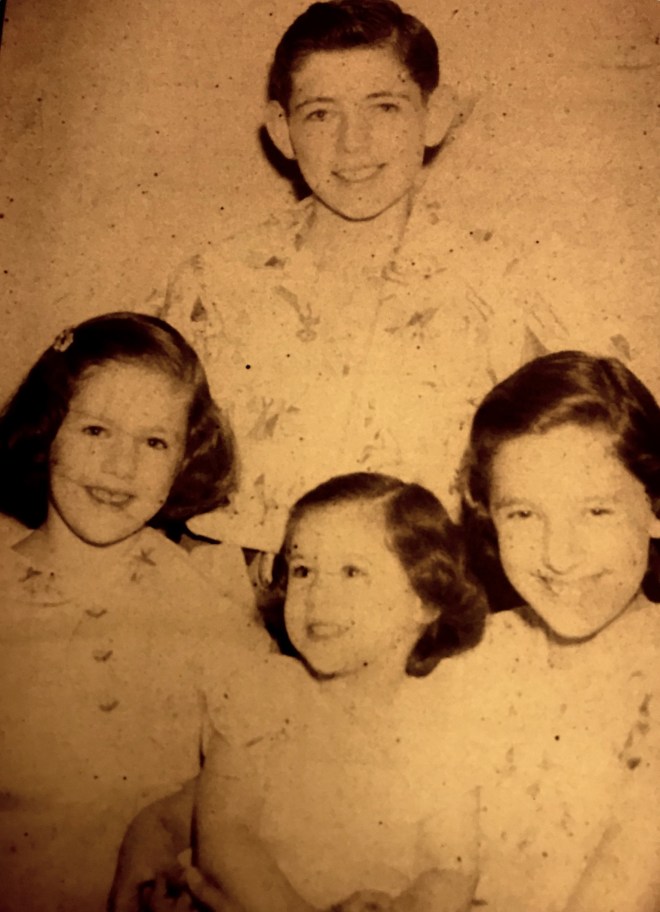
When I was growing up my mom talked constantly about the tragedy of losing her two younger sisters in 1936, when she was about thirteen years old. The only female left in her home besides her mother, she always felt that her life would have been better if only she’d had someone else like her, another girl, rather than being sandwiched between four brothers. Gertrude, who was three years younger than her, developed rheumatic fever, likely following a strep or scarlet fever infection. Mom said she had a hole in her heart. I suspect she more likely had a leaky valve. Most probably finances prevented my grandparents from having a common childhood infection like strep or scarlet treated, often the precursors to rheumatic fever. Antibiotics had been around for about ten years. Did they even know about them in the tiny world they occupied? I’ll never have the answer to these questions. I know that Gertrude wound up bedridden before she died, and that mom did what she could to help her. Her lasting memory was how awful it felt to kiss her sister goodbye, her lips on that cold cheek. What I didn’t know was that mom carried Gertrude’s braid with her for the next 78 years, from her childhood into her old age, through every move she made in her life. I found that braid wrapped in a handkerchief in a plastic bag in a dresser drawer a few months before she died at almost ninety-two years old.

I only have one more damaged photo of my aunt Gertrude. She might have been four or five. As it is undated, her age at the time will remain a mystery. I don’t know if there are any photos of mom’s other sister, Norma, who died just months apart from Gertrude. She was an infant, about 6 months old. From what mom remembered, the death was unexpected and swift. To me it sounded like Sudden Infant Death Syndrome event, a term that wouldn’t come into use until decades later. Mom also said that her eldest brother had dropped Norma on the floor at some dim point in time before she died. I hope that teenaged boy never felt responsible for possibly contributing to such a tragedy. I suppose she could have suffered a subdural hematoma from a dramatic fall. Regardless, her little life ended too soon. When mom shared her vivid memory of this loss, she couldn’t have anticipated the transposition of that memory into my mind – an image of Norma being taken out of their apartment in a suitcase. A chilling snapshot of a dreadful moment in time.

Reinforcing my mom’s wistfulness for her absent sisters was the fact that my grandmother, reeling from these agonizing losses, left her home in Chicago for awhile, to be with her own sisters who lived in Detroit. I can imagine the power of that symbolism, my mom realizing that the solace afforded by those sisters was something she would never experience in her life. The power of her feelings stayed with her. I grew up knowing that having sisters were a critical component of a healthy, happy life. But is anything ever so simple? At the same time mom was shaping my worldview with this fundamental precept about the importance of sisters, she was waging a bitter campaign against my father’s only sister, Sylvia.

I don’t know much about my dad’s family. Dad wasn’t a big talker. Most of what I learned came to me from mom, through her definitely hostile lens toward her in-laws. I never knew my dad’s parents. My grandfather died when dad was only eight years old, leaving his mother, his older sister and his younger brother on their own. Dad took on the classic role of “man of the house” at an early age. Because he was only nineteen when he fell madly in love with my mom, his family was decidedly disappointed that he was moving on from them to start his married life, abandoning their family unit. Mom said she was poorly received, especially by dad’s mom and Sylvia. Those two relocated from Chicago to Sioux City, Iowa at some undetermined time. During the first eight years of my parents’ marriage, they had my older brother and sister while living with my maternal grandparents in Chicago. I was born in 1951 and eight months later, our family moved to Iowa so dad could join a business venture with Sylvia’s husband. His mother had recently died there, shortly before I was born. Mom told me that dad remarked that she was carrying his mother’s name in my as yet unborn state. Her name was Rae which my mother hated – thus I became Renee, after someone I never knew.

I don’t remember anything about being with those people. All I know is that mom detested Sylvia who she felt was bossy and jealous of my parents’ relationship. Mom said Sylvia pushed her into cutting her long hair to make her look less attractive and that she couldn’t stand watching Sylvia snuggle with me. The business venture, selling water conditioners and farm implements, took dad away from home, leaving Sylvia in charge. At least that’s what I was told. After several years passed, mom was overwhelmed by being home with now four of us kids, in an environment which made her miserable. She told dad she wanted to move back to Chicago and hoped he’d come too. When I was seven we all left Sioux City. Contact with Sylvia was minimal and dad’s family life became mom’s parents and most especially her younger brother’s. His own siblings were never close again. Mom felt righteous about having driven a wedge between dad and his sister as she thought Sylvia was a terrible person. The dissonance of that attitude with her own beliefs was not addressed.

I saw that side of our family at a few weddings, never getting to know my three cousins except in the most peripheral way. Mom came first for my dad and never spoke about missing his siblings. As I grew up, I marveled at the dichotomy between mom’s feelings about the importance of sisters while never thinking twice about separating dad from his family. She held on to her bitterness. When dad died, one of her first statements within minutes was telling us that Sylvia wasn’t allowed to attend his funeral. I never forgot that jaw-dropping remark. In my adult life, I’ve made a few attempts to locate my paternal cousins but after sending out a few inquiries, I gave up. I don’t know if any of them ever looked for me. Their side of the family saga remains a mystery.

The ideal sister paradigm I held as a standard was further challenged by my entry into Michael’s family. His mother, a privileged, superficial person with whom I had no synergy, was the older of two sisters. By the time I met her, whatever relationship she might have had with her younger sister was seriously damaged. Those two spent more time not speaking to each other than they did communicating. In all the decades I was with Michael, I only saw his aunt Eleanor and her family perhaps half a dozen times. When we got married they didn’t attend the wedding. The irony of so little contact was that Michael really felt more compatible with his aunt than he did with his own mother. I couldn’t find a single photo of her in the hundreds that we collected through our life. This fracture carried over to the next generation. Michael had an older sister. Betsy was a high strung person who despite her fervent wish to be as unlike her mother as possible, was in actuality, her virtual clone. She was hostile toward Michael most of their young life. As they matured, they each tried to make efforts to establish a rapport, but invariably she wound up in an adversarial posture in even the most trivial situations. Mostly they were unable to develop intimacy, each circling the emotional chasm between them. Their dad also had a sister whom he rarely saw. When she died, he didn’t attend her funeral, causing his only niece to permanently sever ties with him.


Their family had no role models for bridging the issues that can separate siblings. Each of them had a desire to improve their relationship but they lacked the necessary skills. I remember talking about about all these less than ideal kinships between the siblings with my mother, as I was curious about her ability to still believe that having a sister would automatically ensure a better life. She was somehow able to hang on to her childhood dream while acknowledging the more common wreckage that was happening in our families. That ultimately included our nuclear family.

When I was born, my brother was almost eight and my older sister was three months past five years old. My younger sister came along when I was two and a half. The gap between the older two and us younger ones grew more pronounced as we grew. Their life experiences were so different from ours. But aside from the chronological gap, I always had a sense that my older sister wasn’t thrilled that I’d ever shown up. She was remote and highly critical of me. As a child and adolescent I found this distance confusing. My approach to the discomfort was to feel helpless about her in addition to making sure that I never made my younger sister feel the same way. The truth was that she and I shared some common traits but fundamentally were the classic oil and water mixture who could never blend together. As years passed, the older two siblings were moving into adult activities while we younger ones were still just kids. My mom always said she felt like she’d had two different families.

There was never a time during our youth when we we were fully estranged but the levels of closeness between these “families”was palpably different. Eventually life took the older two into marriages while my younger sister and I were sharing our youth. While we were always in contact we didn’t experience each other’s lives. By the time I was an adult, my sister had moved away from Chicago and never returned. My brother lived closer to my parents but his life was fraught with emotional difficulties which weren’t conducive to peaceful times with anyone. Eventually my younger sister moved to the community where I lived and some years later, my parents joined us as well. Because they were aging, I organically stepped into the role of caregiver, supplanting the natural progression of responsibilities often conferred by birth order. As mom and dad’s needs changed, the dynamic between me and my older siblings declined precipitously. I always felt that each of them always had issues with me but as my parents became ill, I had no time to consider those feelings. My dad died and my mom required care. Having my younger sister was a good thing but there was distance and vastly differing views between me and the others. Ultimately I became further remote from both of them. My brother died in 2015, a few months before my mother. My older sister and I may as well have been from different planets. Our relationship essentially disappeared after my mother’s death. Despite all the divergence I’d seen from mom’s idealized sister scenario I never thought that could happen in my personal life.

For years, I’ve thought about all the lost sisters, especially the ones with whom I thought I could’ve had a relationship. I did try. But my efforts in the past brought nothing but failure and negative feelings. Both Michael’s sister and my older one have birthdays within a day of each other in early February. Each year when those days arrive, I have the urge to contact them, to try finding a way to repair the breaches. But as I’ve aged, I’ve recognized that my mom’s idyllic childhood belief was something she couldn’t practice in reality. Neither could I. Because I’ve had a lifelong successful relationship with my younger sister, I know excellent familial ties are real. But they don’t always happen, even when good intentions exist. Reality can be so sad and anyone can be lost. One of life’s harsh facts.